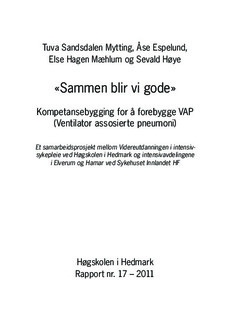«Sammen blir vi gode». Kompetansebygging for å forebygge VAP (Ventilator assosierte pneumoni)
Research report
Permanent lenke
http://hdl.handle.net/11250/133968Utgivelsesdato
2011Metadata
Vis full innførselSamlinger
Sammendrag
Norsk: Bakgrunn: Ventilator assosiert pneumoni (VAP), forårsaker flere dødsfall enn noen annen sykehusassosiert infeksjon, gir økt antall liggedøgn og medfører høye kostnader. Mellom 10–20 % av pasienter som er intubert lenger enn 48 timer, utvikler VAP. Intensivavdelingene manglet en overbyggende prosedyre og erkjente ulik praksis i de ulike intensivavdelingene i forhold til å forebygge VAP. Studenter ved videreutdanning i intensivsykepleie ved Høgskolen ga tilbakemelding på ulikheter mellom det de lærer på skolen og det de lærer i praksis.
Hensikt: Hensikt med samarbeidsprosjektet er å fremme sykepleiere i intensivavdelingene og studenter i videreutdanning i intensivsykepleie sin kompetanse i å forebygge VAP for oralintuberte respiratorpasienter.
Metode: Et fagutviklende prosjekt med en kvantitativ og kvalitativ tilnærming, som er inspirert av handlingsorientert forskningssamarbeid. Det ble utarbeidet kunnskapsbaserte prosedyrer for VAP forebygging som så ble implementert i avdelingene ved hjelp av følgende intervensjon: Fagdag for studenter og ansatte, med teoretisk innføring og simulering og innføring av diskusjonsgrupper i avdelingene. Data fra et spørreskjema til ansatte og studenter (før og etter intervensjon), dybdeintervjuer og et evalueringsskjema fra fagdagen, dannet grunnlaget for å evaluere intervensjonen.
Resultater: Både studenter og ansatte ser ut til å ha økt sin kompetanse i løpet av prosjektperioden. Ansatte og studenter legger vekt på at økt fokus i avdelingen, fagdag og diskusjon med kollegaer innad og på tvers av avdelinger, har bidratt til økt bevissthet og felles praksis i de to intensivavdelingene. Konklusjon: Kompetansebygging ser ut til å bedre studenter og ansatte til å forbygge VAP. Ved implementering av ny VAP forebyggende prosedyre kan en intervensjon basert på fagdag og diskusjonsgrupper være nyttig for å øke ansatte og studenter sin kompetanse i å forebygge VAP. English: Background: Ventilator associated pneumonia (VAP), causes more deaths
than any other hospital acquired infection, increases the number of patient
days and involves high costs. Between 10–20 % of patients who are intubated
for more than 48 hours, develop VAP. The two intensive care units (ICU) in this
project lacked a nurse-led care pathway based on the best available evidence
to prevent VAP. They also, acknowledged that different practices were used in
the ICUs in relation to the prevention of VAP. Students who were studying in-
tensive care nursing at the College gave feedback on the differences between
what they learned in theory and what they learned in practice.
Aim: The aim of the study was to improve competence in the prevention of
VAP for oral intubated patients of two groups of nurses: nurses working in ICUs
and students studying through continuing professional education in intensive
care nursing.
Method: This study had a quantitative and a qualitative approach, informed
by action-oriented research. The evidenced-based care pathway for VAP prevention was developed and implemented in the ICU using the following inter-
vention process: a one day seminar for students and staff, which included
a theoretical introduction and simulation, and the introduction of discussion
groups in the two ICUs. To evaluate staff and students` competence and the
intervention process, data were collected using a questionnaire (before and af-
ter the intervention process), depth interviews and a questionnaire to evaluate
the seminar. Results: The data show that both students and staff had developed their
competence during the study period. Staff and students emphasized that the
increased focus in the ICU, the seminar and discussion groups with colleagues
within and across the ICU, have contributed to their increased awareness and
development of common practices in the two intensive care units.
Conclusion: The intervention used in this study improved the competence of
students and staff to prevent VAP. When development and implementing new
VAP care pathways, an intervention based on a seminar and discussion groups
may be benefcial in increasing staff and student competence in preventing
VAP.
